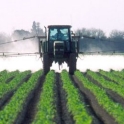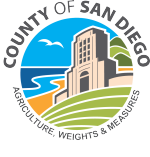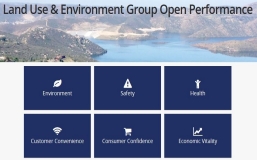Pesticide Regulation
The size and diversity of California agriculture, and the State’s increase in urbanization, require a more complex partnership between state and local pesticide regulatory authorities than anywhere else in the nation. The California Department of Pesticide Regulation works closely with each county’s Department of Agriculture, Weights & Measures (AWM), which is the primary local enforcement agent for pesticide laws and regulations.
In the County of San Diego, AWM Pesticide Regulation Program (PRP) protects human health and the environment by regulating pesticide use, and by fostering reduced-risk pest management through permits, outreach, inspections, and illness investigations, and enforcement. Our priority is to protect the health and safety of employees and the public while supporting a sustainable environment by identifying and reducing risk associated with the use and storage of pesticides.
In addition to monitoring activities, PRP conducts outreach to raise industry and public awareness of pesticide safety laws and regulations supporting increased regulatory compliance. Inspectors conduct numerous outreach events to local industry members, including fieldworkers, pesticide applicators, pest control advisors, and businesses. PRP also conducts outreach to the public to educate residents on safe use and storage of registered household pesticides and cleaning agents.
PRP’s use monitoring responsibilities involve inspecting agricultural operations, pest control businesses, pesticide dealers, and pest control advisors. In addition to regulating pesticide use in agriculture, PRP also regulates structural pesticide use. This includes monitoring pest control companies that tent and fumigate homes and other structures for termites and treat yards for common household pests such as fleas, ticks, and spiders. PRP is also responsible for investigating all pesticide-related illnesses and complaints that occur in the county. PRP is required to take appropriate corrective actions when non-compliances are found. Depending on the severity of the non-compliances, there are various potential actions, such as issuing administrative civil penalties, issuing warning letters, prohibiting harvest of a crop that contains illegal residues, and referring cases for license suspension or revocation, or civil prosecution.
- CDPR Report: 97% of Fruits and Vegetables Tested in California are Free of Illegal Pesticide Residues
- US EPA Update on Dacthal Herbicide Health Risks
- Diphacinone Allowed and Prohibited Uses
- Second Generation Anticoagulant Rodenticide Restrictions
- School Notification Presentation
Continuing Education for License Holders
Pesticide Safety Information Series (PSIS) now available
Private Applicator Exam
Do you want to schedule or reschedule taking the Private Applicator Certificate Exam?

Bee Protection
Bee Protection Practices Agreement for Avocados
How to Reduce Bee Poisoning From Pesticides
Surface Water Protection
Nonagricultural Surface Water Regulations
Respiratory Protection
Synopsis of the New Respirator Regulations – Start Here!
Respirator Information In English | Respirator Information En Espanol |
Written Respiratory Protection Program | Programa anual de protección respiratoria |
For the Complete Regulation, visit www.cdpr.ca.gov and click on "Regulations" in the Quick Finder
Questions and Answers on Voluntary Use of Respirators
Structural Fumigation Notification Form (PDF)
Structural Inspection Forms
Structural Fumigation Use Monitoring Inspection Report
Structural Use Monitoring Inspection Report
Pest Control Business Headquarters Inspection Report
Presentations
2023 IPM for Landscape Professionals
Resources for Continuing Education
If you would like more information on online use reporting, please email us.
Pesticide Licensing and Registration Info
If you have a question, please call. Agricultural/Standards
Inspectors are available to answer your questions:
Monday through Friday from 1-3 p.m.
Call
858-694-8980 or stop by the San Diego Office
| Department of Pesticide
Regulation (DPR) PO box 4015 Sacramento, California 95812-4015 Licensing: 916-445-4038 | Structural Pest Control
Board 2005 Evergreen St, Suite 1500 Sacramento, California 95815 General Information: 916-561-8704 |
Most of the documents referenced on this page are in "PDF" format and require that you have Adobe Acrobat Reader on your computer.
You can download Acrobat Reader here.
Section 1: Licensing and Registration
For these categories, you must be LICENSED with the State and REGISTERED in all counties where you work. You can obtain all applications (except for structural pest control operator license applications) from our office. Some forms are available online from the Department of Pesticide Regulation. Those forms are hyperlinked and appear in blue.
You are a maintenance gardener and occasionally apply pesticides as part of your maintenance gardening business.
What Do You Need?
1. Maintenance Gardener Qualified Applicator Certificate in Category Q (QAC-Q)
2. Maintenance Gardener Pest Control Business License.
3. At the beginning of each year, register with the San Diego
Agricultural Commissioner
Pest Control Equipment
Requirements - FORM
AWM 222 (12/97)
Specifics
- We have applications to take the Qualified Applicator Certificate test in category Q, Landscape Maintenance, given by California Department of Pesticide Regulation (DPR).
- After passing the test, you apply to DPR for a Maintenance Gardener Pest Control Business License. We have the applications.
- When you have both those items, register with us, Monday-Friday from 1 p.m. to 3 p.m. or by appointment. Cost is $25.00/year.
- You will need to complete continuing education classes (CE) to renew your certificate. Category Q requires 8 hours of CE every 2 years.
Agricultural Pest Control Operator
You would like to have a business applying pesticides. This does not include applying pesticides to buildings.
What Do You Need?
- Qualified Applicator License in the appropriate category and
- Pest Control Business License.
- At the beginning of each year, register with this department.
- Pest Control Equipment Requirements - FORM AWM 222 (12/97)
- Pesticide Safety Information (Pest Control Operations) - FORM AWM 225 (5/97)
- Application for Pest Control Equipment Registration
Specifics:
- We have applications (pink) for the Qualified Applicator License given by the California Department of Pesticide Regulation (DPR).
- After passing the test, you apply to DPR for a Pest Control Business License. We have the applications (white).
- When you have both those items, register with us, Monday-Friday from 1 p.m. to 3 p.m. or by appointment. Cost is $75.00/year.
- You will need to complete continuing education requirements to renew your license.
Agricultural Pest Control Advisor
You wish to give advice to growers regarding pest control.
What Do You Need?
- Agricultural Pest Control Advisor License.
- At the beginning of each year, register with AWM.
- Pest Control Advisor Requirements - FORM AWM 243 (6/95)
Specifics:
- We have applications (green) to take the Agricultural Pest Control Advisor License test given by the California Department of Pesticide Regulation (DPR).
- When you have your license, register with our office, Monday-Friday, 1 p.m. to 3 p.m. or by appointment. Cost is $5-$10/year.
- You will have to complete continuing education requirements in order to renew your license.
- Inspection forms - DPR Pest Control Records Inspections
You wish to become a Journeyman or Apprentice Pilot.
What Do You Need?
- Pest Control Aircraft Pilot Certificate.
- At the
beginning of each year, register with this department. Bring:
--Current FAA Medical Certificate
--Valid Commercial Pilot’s Certificate.
Specifics:
- We have applications to take the Pest Control Aircraft Pilot Certificate test given by the California Department of Pesticide Regulation (DPR).
- Apply to DPR for a Business License.
- When you have these, register Monday-Friday, 1 p.m. to 3 p.m. or by appointment. Cost is $5-$10/year.
- You will need to complete continuing education classes (CE) to renew your license. After your first renewal, you need at least 20 hours of CE every 2 years.
You want to have a business with employees who provide services to farms, groves, etc.
What Do You Need?
- Farm Labor Certificate of Registration, and
- Farm Labor Contractors License.
- At the beginning of each year, register with this department.
- Current Farm Labor Contractor Registration.
- County Farm Labor - Contract Registration - FORM AWM 000 (2/99).
Specifics
- Contact the Federal Department of Labor.
- Contact the California Department of Industrial Relations.
- Register Monday-Friday, 1 p.m. to 3 p.m. or by appointment. Cost is $75.00/year
Translations: Spanish, Tagalog, Farsi, Arabic, Chinese, Vietnamese
Structural Pest Control: Operator
You want to have a business applying pesticides to buildings.
What Do You Need?
- Operator license in one or more of the following branches:
-
- Branch I -- Fumigation
- Branch II -- General pests
- Branch III -- Fungus, subterranean termites
- Branch IV -- Fungus roof treatment
-
- At the beginning of each year, each business needs to give notification to County Agricultural Commissioners in each county where work will be done.
Specifics
- Applications for operator licenses must be made to the California Structural Pest Control Board. Call the licensing division at 1-800-737-8188.
- Structural Fumigation Notification - FORM AWM 205 (12/98)
Structural Pest Control: Field Representative
You want to make structural inspections or apply pesticides to buildings.
What Do You Need?
- Field Representative License in one or more of the following
branches:
-
- Branch I -- Fumigation
- Branch II -- General pests
- Branch III -- Fungus, subterranean termites
- Branch IV -- Fungus roof treatment
-
Specifics
Applications for field representative licenses must be made to the California Structural Pest Control Board. Call the licensing division at 1-800-737-8188.
Structural Pest Control: Applicator
You want to work for a business applying pesticides to buildings. What do you need?
- Applicator's License
Specifics
- Applications for Applicator's License must be made to the Structural Pest Control Board. Call the licensing division at 1-800-737-8188.
Section 3: Purchase and Use of Pesticides
Operator Identification Number
You want to apply pesticides in agricultural areas (agricultural production, parks, golf courses, cemeteries, rights-of-way). What Do You Need?
- Obtain an operator identification number from this office.
- Give a copy of the operator identification number to pesticide dealer when purchasing pesticides.
- Report pesticide use to AWM on pesticide use reports.
Specifics
- AWM issues operator identification numbers Monday -- Friday from 1 p.m. to 3 p.m., or by appointment.
- If you are producing an agricultural commodity, bring a map of your farm identifying location(s) of crops.
You have applied a pesticide which required an operator identification number or a restricted materials permit; or you have a business applying pesticides. What Do You Need?
You must submit a Pesticide Use Report. When you receive your operator identification number and/or restricted materials permit, our inspector will inform you of which of the three types of Pesticide Use Reports you need to submit.
The three types are:
- Production Agricultural Monthly Use Report - Form DPR-PML-017C (8/15) and Multiple Site/Commodity Form DPR-PML-183 (8/15).
- Pesticide Use Report (Job use report) - Form DPR-PML-025 (8/15).
- Monthly Summary Pesticide Use Report - Form DPR-PML-060 (8/15).
Specifics
Pesticide use reports must be submitted if you:
- Produce an agricultural commodity.
- Apply pesticides in an area defined as agriculture by the California Department of Pesticide Regulation. This includes golf courses, cemeteries, rights-of-way, parks, and other areas.
- Apply pesticides for others as part of your business.
Pesticide use reports must be submitted to this department by the 10th of the month following pesticide use. Forms are obtained from AWM or use the online reporting system.
Section 3: Restricted Materials Permit
You want a restricted materials permit or to train employees. What Do You Need?
- Obtain a Private Certified Applicator Certificate.
Specifics
Private Certified Applicator Exam Schedule:
Most Fridays at 10 a.m.
Call (858) 694-8980 For REQUIRED Reservations! A score of 70% or greater is required to pass. In December, January, and February, exams are also given in North County.
You want to apply restricted pesticides. What Do You Need?
- Have a Qualified Applicator License or Certificate OR
- Obtain a Private Certified Applicator Certificate (see above).
- Give a copy of your permit to your pesticide dealer.
- Application - Restricted Materials Permit, FORM PR-ENF-125 (9/00)
Specifics
- Call us to make an appointment for your Restricted Materials Permit.
- Bring a copy of your Private Certified Applicator Certificate to your meeting with the inspector.
Notice of Intent of Use of a Restricted Material
You want to submit a Notice of Intent to use a Restricted Material.
What Do You Need?
- Restricted Material Permit from the County authorizing use.
- Notify AWM 24 hours before applying a restricted material.
- Notice of Intent to Apply restricted Materials, FORM PR-ENF-126x (2/99)
Specifics
Phone 858-694-8980 between 8:00 a.m. and 5:00 p.m., or fax 858-467-9277. AWM has forms available as guides for required information.
Section 4: Employee Training Requirements
Who Handle Pesticides. What Do You Need?
- Pesticide labels, material safety data sheets
- A written training program - Written Training Program for Pesticide Handlers - FORM AWM 224 (12/98)
- Pesticide Safety Information Series
- Qualified person to give training. A qualified person (i.e., Certified Private Applicator, Qualified Applicator License, etc.) must conduct training for agricultural employees.
- Documentation of training.
Pesticide Safety Training Record - FORM AWM 226 English (12/98) -or- FORM 226S Spanish (12/98)
Medical Supervision - FORM AWM 228 (12/98)
Specifics
At least yearly, provide training in:
- For each pesticide or chemically similar group of
pesticides:
-
- Need for, limitations, use, and sanitation of any required personal protective equipment.
- Environmental concerns such as drift, runoff, wildlife hazards, and Endangered Species.
- Decontamination and washing after exposure period.
-
- Routes of exposure
- Hazards, acute, chronic, sensitization effects
- Common symptoms of overexposure
- First aid, obtaining emergency medical care, heat heat-related illness
- Warning about taking pesticides and pesticide containers home
- Hazard communication program--Section 6723, CCR, Title III
- Employee rights listed in Section 6704, CCR, Title III
- Format and meaning of information contained in pesticide labeling.
- Safety requirements and procedures, including engineering controls.
- Inspection Form - Pesticide Use Monitoring Inspection - FORM AWM 221 (5/98)
Who Enter Areas Sprayed With Pesticides. What Do You Need?
- Employer Requirements for Fieldworkers - Employer Requirements for Fieldworkers
- Section 6764, CCR, Title III
- Section 6761, CCR, Title III
- Pesticide Safety Information A9
- Qualified person to give training
- A qualified person (i.e., Certified Private Applicator, Qualified Applicator Licensee, etc.) must conduct training for agricultural employees.
Specifics
- Each year you must provide training in:
- Decontamination and washing after exposure period
- REIs (Reentry intervals), posting, sign formats
- Where pesticides are encountered
- Routes of exposure
- Hazards, acute, chronic, sensitization effects
- Common symptoms of overexposure
- First aid, obtaining emergency medical care. Medical Supervision - FORM AWM 228 (12/98)
- Warning about taking pesticides and pesticide containers home
- Hazard communication program--Section 6761, CCR, Title III
- Employees Rights listed in Section 6764, CCR, Title III
Section 5: Miscellaneous
- Hearing Process Outline - DPR-ENF-086
- California Code of Regulations
- Publication List - California Department of Pesticide Regulation
- Bee Hive Registration - Online information and registration forms.
- Bee Where - Obtain contact information for beehive owners near application sites
- Bee Check Quick Start Guide
- Pesticide Pre-Application Site Evaluation
- Field Worker Safety Inspection Report
- Pesticide Use Monitoring Inspection Report
- Commodity Fumigation Use Monitoring Inspection Report
- Field Fumigation Use Monitoring Inspection Report
- Structural Fumigation Use Monitoring Inspection Report
- Structural Use Monitoring Inspection Report
- Pest Control Headquarters Inspection Report
- Pest Control Business Headquarters Inspection Report
Other Forms
- Structural Fumigation Notification Form - AWM Form 205 (4/07)(pdf)







